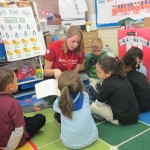It is the responsibility of sport governing bodies to support and encourage humanitarian athletes who speak out for causes grounded in the principles of Olympism, argue Mary Hums, Eli A. Wolff, and Nina Siegfried in this comment.
Polykosmia is a universe dreamed up by students in two classes led this spring by Stephen Slota (he/him, they/them), Neag School assistant professor-in-residence of educational technology. The project, an exercise in both worldbuilding and lesson planning, involved designing everything from mythologies to local governments to individual character arcs. Students also learned how to adapt worldbuilding activities into K–12 classrooms and how to design lesson plans that connected story objectives in a fictional world with learning objectives in the classroom.
Tamika P. La Salle, an associate professor of educational psychology with the University of Connecticut’s
Neag School of Education, said immigrant families tend to come with much more of a group mentality.
“It’s not just doing better for them, it’s doing better for their families and making their family proud. A lot of them have this collective identity,” said La Salle.
The Neag Foundation has provided the UConn Collaboratory on School and Child Health, co-directed by Neag School’s Sandra Chafouleas, with a two-year grant to facilitate work in the Think about the Link Project.
“It is an opportunity for baseball to give back, not only in a way to entertain, but to bring us back to a place of engagement as a team. Although baseball is non-essential, what we’re missing is that spirit of team and we could use that not only on the field, but also for our country and to figure out how we can address these issues in our country,” Glanville said.
“As a parent, it is a daily struggle not to get swept up in the sadness of the losses forced by COVID-1,” writes Sandra Chafouleas, a UConn Board of Trustees Distinguished Professor. “As a school psychologist, I am trying my best to heed what I know about coping and promoting resilience. Life is supposed to present us with bumps — bumps can help us grow if the right supports are available to brace for them. But the intensity of the current global situation means that we need to identify and draw on positive coping resources more purposefully.”
Six of these faculty members met earlier this year at the UConn Hartford campus in the historic Hartford Times Building to discuss changes in the program thus far, elements that appear to work well, elements that present some challenges and directions the program may take in days and years ahead. Wallace’s editorial staff had the opportunity to listen in and report back.
Black lives matter. We share the grief, sadness, and anger at the loss of George Floyd, whose murder follows so closely on that of Breonna Taylor, Ahmaud Arbery and so many others. Each of their lives, like each and every Black life in our community and around the world, is unique, beautiful, and irreplaceable, and deserving of respect and dignity. The great and abiding shame of our nation is our inability to acknowledge, confront, and redress the legacy of white supremacy and the failure of our institutions, particularly our law enforcement institutions, to respect the human rights of black and brown people.
It’s one thing to learn a skill in a class. It’s another to practice it in the real world, where conceptual lines are blurrier than they are in textbooks. It’s a distinction that leads many professional training programs to feature internships, which some may call clinical experiences of practicums, to complement the skills students learn in class. It is one that led the University of Connecticut’s Administrator Preparation Program (UCAPP) to reexamine internships when it began revamping its offerings to strengthen principal training.
Students need to feel safe and have supportive relationships for their social, emotional, and academic learning to be optimized. Students experiencing trauma, such as from public health crises, weather disasters, or other upsetting events, may have been exposed to unpredictable schedules, inconsistent supervision, or food insecurity and desperately need school to be their safest, most predictable, and most positive setting, especially if they have been displaced or are without utilities or basic comforts.


